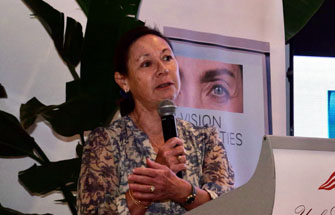BNP Paribas is extremely sensitive to Natural Capital issues. That's why, last November, Françoise PUZENAT, Director of the Monaco Territory, joined forces with a local reference, the Centre Scientifique de Monaco, to organize a conference on the theme: Natural Capital: Issues and Solutions for a Sustainable Future.
"I'm delighted that BNP Paribas is working alongside the CSM, which is doing remarkable work in Monaco on issues relating to natural capital. The preservation of natural capital is fundamental, both for present and future generations. Banks have a role to play in adapting financing criteria to take better account of these issues. In 2010, the BNP Paribas Group adopted strict sectoral policies to govern its financing and investment activities in the sectors most at risk for the environment. The Group has also decided to devote 4 billion euros of financing by 2025 to companies contributing to the protection of terrestrial and marine biodiversity," declared Françoise PUZENAT.
For the first time in Monaco, the conference brought together a panel of entrepreneurs, economists, researchers and scientists from international institutions committed to preserving natural capital. Three sessions were devoted to philanthropic and intergovernmental institutions, companies and startups, and major players in the financial sector. This was an opportunity for each speaker to discuss innovative initiatives in their respective sectors. The conference continued with a two-day multi-disciplinary workshop aimed at defining natural capital, not only maritime but also terrestrial, so as to be able to evaluate it economically and include it in national wealth.
To preserve our Natural Capital, Science, Economics and Finance all have a role to play.
"Putting a cost on natural stock highlights its internal ecosystemic value resulting from the synergy between science and economics, finally integrated. In order to protect the environment and its precious biodiversity, we need to interact to positively influence decision-makers," stresses Professor Denis Allemand, Scientific Director at CSM. "Nature can help us by providing effective tools to fight climate change and biodiversity loss. Bringing together the worlds of business and finance in a joint project with scientific research is certainly a winning approach, and we are determined to make a full contribution to it," adds Dr Nathalie Hilmi, Head of the Environmental Economics Section at CSM.
Since 2010, BNP Paribas has been deploying restrictive financing and investment policies in the sectors most at risk for the climate, notably in order to fight deforestation. More recently, the Group has stepped up its actions to safeguard the natural capital of areas that are particularly sensitive in terms of biodiversity. Since 2020, BNP Paribas has undertaken not to finance oil and gas exploration or production projects in the Arctic offshore or in the Arctic National Wildlife Refuge; not to include in its trading activities oil exports by sea from the Amazon Sacred Headwaters, in the Esmeraldas region of Ecuador; finally, to provide financial products and services only to customers with a "zero deforestation" strategy by 2025, including those producing or purchasing beef or soy from the Amazon and Cerrado regions of Brazil.






